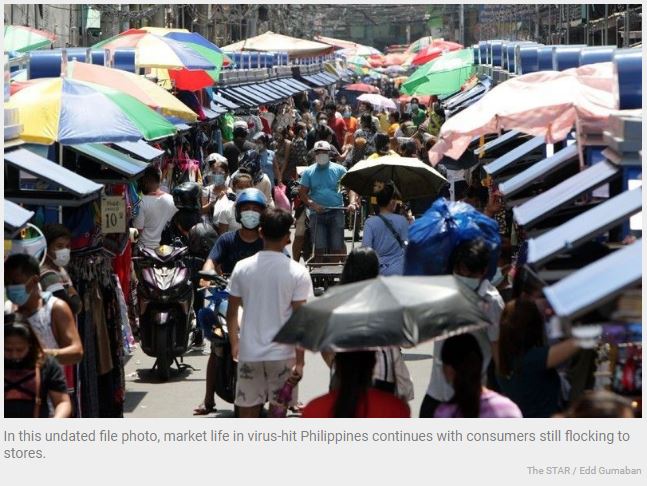Philippines: After breaching target in April, inflation threatens economic recovery
MANILA, Philippines (Update 1, 11:49 a.m.) — Inflation in April quickened at its fastest in over two years, threatening to derail a nascent recovery as high prices crimp consumer spending.
In an online briefing on Thursday, the Philippine Statistics Authority reported inflation accelerated 4.9% year-on-year in April, quicker than the March print of 4%.
The latest reading breached the state’s 2-4% target. It also matched the January 2019 figure.
Year-to-date, inflation averaged 3.7%.
“The inflation outturn is consistent with the BSP’s assessment that inflation will remain elevated over the near term due to the continued volatility in global oil and non-oil prices, reflecting largely the continued impact of the conflict in Ukraine on global commodities market,” the Bangko Sentral ng Pilipinas said in a statement.
“Inflation could settle above the government’s target range in 2022, before decelerating back to target in 2023 as supply-side pressures ease. While there are signs that inflation expectation is higher for 2022, it remains broadly anchored to the target in 2023,” it added.
Sought for comment, Jun Neri, lead economist at Bank of the Philippine Islands, said the quickening price growth, if uncontrolled, could mess up the economy’s recovery.
“Further acceleration of inflation prints in 2Q and 3Q2022 will clearly cap the economy’s growth potential this year as consumers, compelled to allocate a bigger share of their budgets toward basic goods and services end up spending less on discretionary items,” Neri said.
“If global prices of oil, coal, fertlizer and other key commodity remain elevated causing inflationary expectations to be further de-anchored, our return to pre-pandemic output will again be delayed by as much as 1 to 2 quarters,” he added.
Inflation accelerated due in part to an unprecedented increase in crude oil prices, as Russia continued its military invasion of Ukraine. Back in its April briefing, the PSA was mum on how the spillover effects from expensive oil would be felt— but food prices around the country are now increasing.
Nicholas Antonio Mapa, senior economist at ING Bank in Manila, said these spillover effects were clearly visible in the April print. “Negative spillovers from the ongoing conflict in Ukraine were evident in today’s inflation reading with elevated energy costs feeding through to higher transport and energy costs, “ he said in an emailed commentary.
“Meanwhile, food prices were also higher given the country’s dependence on imported fertilizers and imported wheat,” Mapa added.
Latest PSA data revealed food prices have gone up, with inflation impacting prices of vegetable (9.2%), meat (4.2%), fish (5.0%), and flour and bread (4.5%) compared to figures in March.
All these inevitably threaten a precocious period of economic recovery for the Philippines, which witnessed a historic economic meltdown due to the pandemic in 2020. Last year, the domestic economy rose 5.7% year-on-year. This year, the national government forecasts growth to fall between 7-9%.
Per National Statistician Clare Dennis Mapa, the impact of expensive oil would first be witnessed in transport fares, which have risen 13% in April.
Sanjay Mathur, lead economist for Southeast Asia and India at ANZ, said that calling this period of rising inflation as stagflation is still a stretch. Stagflation is defined as a period of stagnant economic growth, high unemployment and persistently accelerating inflation rates.
“I can’t say that we are in a stagflationary scenario at all. Growth is improving steadily,” Mathur said in an email. “That said cost push pressures are clearly mounting and inflation can remain above the target range for a considerable period of time. This can potentially dent growth by truncating household purchasing power.”
Consumers outside Metro Manila experienced larger leaps in inflation, PSA data showed. Inflation in these areas were at 5.1%.
For poor families, inflation likewise rose to 3.8% in April. This dataset was still anchored to 2012 baseline prices, unlike headline inflation which was rebased to 2018 prices at the start of the year.
Leonardo Lanzona, labor economist at Ateneo De Manila University, noted that this breach is still alarming but he shied away from calling this a stagflation period.
“This breach is alarming. Nonetheless, the issue is how growth we have achieved so far. If indeed growth is observed, it may be alright to accept some inflation,” Lanzona said in a text message.
“In essence, the inflation can be explained by the rise in government expenditures necessary to prop up the economy. Thus, I don’t think this will lead to stagflation,” he added.
Source: https://www.philstar.com/business/2022/05/05/2178914/after-breaching-target-april-inflation-threatens-economic-recovery


 English
English




